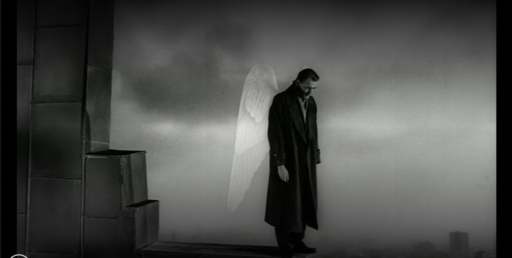Als das Kind Kind war. That’s the line that Bruno Ganz speaks at the very beginning of Wim Wenders’s now classic film Wings of Desire (1987), and then the line is repeated quite a few times throughout the movie. The lines are from something, a poem I suppose, that Peter Handke sent to Wim Wenders when Wenders asked him for help writing the film. Handke said he couldn’t help at first. Then he had an idea and sent Wenders a package of words, which Wenders stuck into the movie wherever he could. Ganz sometimes recites the lines of Handke’s poem with a kind of semi-singing chant voice. There is a softness to the speaking and chanting and reciting that merges into the notes of the cello that hum and resonate alongside the voice. It is beautiful.
One does not always think of German as a beautiful language. Okay, probably one never thinks this. It is the language of Hitler, after all. It is the language of spitting and of bringing up guttural noises from the back of one’s throat. Wings of Desire, though, and among many other things, is a movie about language and about how even German has its angelic side.
Bruno Ganz is, in fact, an angel. In the film that is. He’s an angel drifting over the city of Berlin with a bunch of other angels. Angels, in Wenders’s film, are the silent observers of what people do. The whole conceit of the film, silly on the face of it, is that an angel falls in love with a human person and decides to become human. Insanely, amusingly, and in the end adorably, Peter Falk plays a role in this tale. But I suspect that Falk is mostly in the film because of how his voice sounds, its wonderfully croaky hoarseness.
Falk represents human language, which is worldly and which is marked by the actual physical characteristics of a throat, a fleshy throat that in this case is scarred by a lifetime of playing Columbo and smoking cigarettes. That’s one of the first things that Bruno Ganz’s angel character Damiel does when he descends from the skies and becomes human. He smokes a cigarette.
So what then is language? What is the language of angels and what is the language of people? The way Wings of Desire imagines it, language does not come naturally to angels. They learn language by observing people. In their own realm, the angels seem given more to a kind of direct and immediate apprehension of the thoughts and feelings of others. But since humans cannot but express those thoughts and feelings, even to themselves, without languaging them, so to speak, the angels become creatures of speaking. This is what really draws Damiel down onto the streets of Berlin. Once he has fully participated in language, he is not exactly an angel anymore. He has become more specific, more concrete. He has taken up, without ever exactly intending to, a particular standpoint within the world. Language demands this. It cuts things up into subjects and objects, things doing things to other things. It demands participation. Damiel can’t really participate without going all in. Language, in a sense, makes him real in a way that he’d not been as an angel.
Makes me think of Emanuel Swedenborg. Swedenborg, famously, claimed to have had a series of visions and mystical experiences by which he was brought into contact with angels. They spoke to him, did the angels. But Swendenborg struggled for the rest of his life in trying to express just what it is to chat with an angel. That’s because angels can say in one word what it takes a thousand human words to say. I guess angels are like pictures in that way. Also, according to Swedenborg, “what angels cannot evoke with the words of their language they fill in with the sound, which embodies their sensitivity to the proper arrangement of things; for as already noted, they express their affections through the sounds and the concepts derived from their affections through the words. This is why the things that people have heard in heaven are called ‘ineffable’.”
Swedenborg, besides being delightfully batshit crazy, may have been onto something here. The further one pushes the concept of language into the realm of angels, the less specificity it takes on. The concreteness is abandoned in the favor of allusiveness, innuendo, unity.
Running language in the direction of creation, therefore, pushes it toward cigarettes and circus performers and Peter Falk. Running it the other way takes it into the indistinct realm of sounds, sounds that drone and vibrate in a kind of cosmic murmuring that the old philosophers used to call the musica universalis.
What does this sound like? Probably impossible to describe. I did, however, have the occasion to listen to David Crosby’s first solo album over the weekend. I did so because I’d just heard that Crosby had died. The album is titled If Only I Could Remember My Name, which is pretty darned interesting and even downright biblical given the root Genesis relationship between language and naming. The first track is titled Music Is Love just in case you think I’m going too far here. The song Laughing contains a wonderfully ethereal wordless melody by Joni Mitchell at the height of her angel-singing mode. The song ends in guitar music that seems to have taken over the role of the human voice completely.
The final song, I’d Swear There Was Somebody Here, is just a number of acapella voices harmonizing in rising and falling undulations. Crosby explained that the song was a kind of tribute to his greatest love, Christine Gail Hilton, who was killed instantly in a car crash in 1969, a trauma from which Crosby never truly recovered. The last few seconds of the song sound like something between a howl of a resignation and a hymn. All things at once and then finally nothing, peace.
Morgan Meis has a PhD in Philosophy and is a founding member of Flux Factory, an arts collective in New York. He has written for n+1, The Believer, Harper’s Magazine, The Virginia Quarterly Review and is a contributor at The New Yorker. He won the Whiting Award for non-fiction in 2013. Morgan is also an editor at 3 Quarks Daily, and a winner of a Creative Capital | Warhol Foundation Arts Writers grant. A book of Morgan’s selected essays can be found here. His books from Slant are The Drunken Silenus. and The Fate of The Animals He can be reached at morganmeis@gmail.com.





